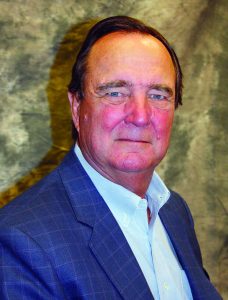 By Tim Pennell, TSCRA Marketing and Transportation Committee chair
By Tim Pennell, TSCRA Marketing and Transportation Committee chair
It seems like everything having to do with information is going electronic. For the most part, that’s a good thing, but when it comes to hauling a load of cattle, allowing commercial livestock haulers to keep a record of their hours in a paper logbook — instead of by an electronic logging device (ELD) attached to their truck engine — may tell a more accurate story of actual driving time, and may allow the drivers to keep animal welfare as much of a priority as their own well-being and the safety of other drivers.
In 2012, the Commercial Motor Vehicle Safety Enhancement Act became law, requiring the Department of Transportation (DOT) to create and enforce an electronic logging device rule. As of last year, all motor carriers and drivers who are required to keep paper records must have installed an ELD in their trucks.
In November of last year, the DOT Federal Motor Carrier Safety Administration (FMCSA) waived this regulation for agricultural haulers for 90 days. Unless we get DOT to extend this exemption for livestock haulers, that waiver ends this month.
According to federal law, commercial drivers are allowed a maximum duty day of 14 hours, to include a maximum of 11 consecutive hours of driving time. Drivers must rest for 10 consecutive hours in a 24-hour period.
The drive across Texas, under the best of conditions, is an 11- or 12-hour event. Even a drive from the middle part of our state to the feedyards in the Texas Panhandle will take the better part of nine hours if there are no problems along the way.
We have several questions for DOT and concerns about the unintended negative consequences of what was most likely a well-intentioned rule.
Since the ELD is attached to the engine of the truck, does it consider the time a truck sits idling at a livestock market while the driver waits for a load of cattle to be sold and loaded?
Does this regulation consider that many livestock haulers must take rural roads and drive through rural town squares at speeds that are much slower than highway speeds to pick up and deliver their loads?
Do DOT regulators understand that it takes a different set of skills to haul live cattle than to haul boxed goods? Stopping to unload cattle at the end of an 11-hour drive and then reload them 10 hours later is much more stressful on the livestock than continuing to the destination, especially when temperatures can be extreme.
Most livestock haulers have participated in specialized training, such as USDA’s Master Cattle Transporter program, which provides instruction on proper animal handling and transportation methods. They also stop multiple times on a long haul to ensure the cattle are well and not under any great stress.
Major studies reviewed by FMCSA show that the livestock sector is one of the safest of the commercial hauling sectors.
Members of Texas and Southwestern Cattle Raisers Association (TSCRA) ask that the waiver granted by DOT in November be extended indefinitely for livestock haulers. It will allow time for the FMSCA and our industry to provide the training and education livestock haulers need to fully understand these logging devices, and will also allow time for the FMCSA to develop livestock-specific solutions and still maintain safety on our roads.
The safety record of those who carry our cattle is already commendable, but our industry needs time to develop transportation practices that build on our strong safety records and the unique challenges of moving living beings over long distances. We will keep you informed of our work with our friends in Washington to create regulations that support a safe and practical livestock transportation segment of our ag industry.
###
PO BOX 101988
FORT WORTH, TX 76185
1-800-242-7820
© 2023 Texas & Southwestern Cattle Raisers Association; All Rights Reserved.
